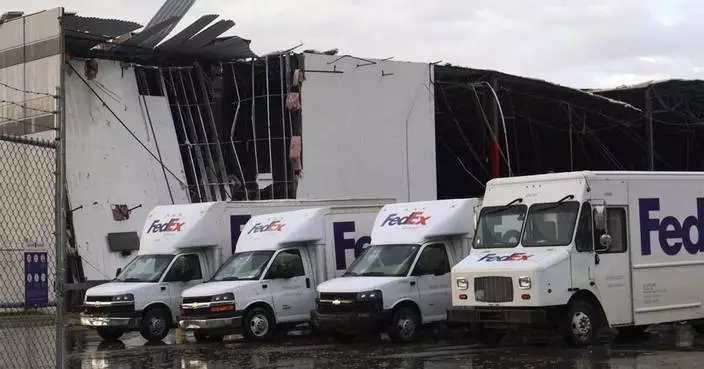For 61% of students, college costs more than they expected, according to a recent survey from College Ave Student Loans conducted by Barnes & Noble College Insights.
Yoselin Guzman, an 18-year-old UCLA freshman from Compton, California, can see why.
"There's like little costs you don't even see," says Guzman, noting how expensive dorm items, books and student orientation are.
When those unexpected costs arise — and your existing financial aid won't cut it — here are four options to get more money for school.
1. CROWDFUND THE SHORTFALL
When Guzman realized her savings and scholarships wouldn't cover her college expenses, she started a GoFundMe campaign to crowdfund $5,000.
"I was a little embarrassed to show people I'm struggling financially," Guzman says.
Getting over those fears helped cover her funding gap. Now, she says the donations have "given me that confidence that I'm not alone in this world."
She's certainly not alone on GoFundMe: The website hosts over 100,000 education-related campaigns each year, though not all are for college tuition and success varies.
"We've seen an increase in crowdsourcing as an option for covering college costs," says Brad Lindberg, assistant vice president for enrollment at Grinnell College in Grinnell, Iowa.
But Lindberg cautions students to work with their school's financial aid office before starting a campaign. The additional funding might affect future aid eligibility, he says.
2. INCREASE YOUR WORK SCHEDULE
GoFundMe allows students to keep any funds they receive, even if they fall short of their overall goal. But there's no guarantee you'll get any money. Working, though, is a surefire way to do that.
If you're eligible for a work-study job, that's typically the best option.
"Your supervisor is a built-in mentor; they understand you are a student first (and there's) flexibility in scheduling," says Ashley Bianchi, director of financial aid at Williams College in Williamstown, Massachusetts.
If you already have a job, consider working more hours. That may be tricky with work-study positions, since earnings are capped at a specific amount, so look off campus or on a college student-focused job board .
Just be careful not to overextend yourself. Bianchi says her college recommends students work six to seven hours a week; Lindberg puts 10 hours as a reasonable amount. But some students may be able to handle more based on their schedules and activities.
3. CHECK EMERGENCY AID PROGRAMS
Many schools offer emergency financial assistance. For example, the University of California, Davis, has emergency grants that don't require repayment. It also offers short-term loans that range from $500 to $1,500.
Always opt for grants first, and know the costs of any loan before borrowing. Leslie Kemp, director of the Aggie Compass Basic Needs Center at UC Davis, also encourages students facing financial shortfalls to think long-term.
"What's your plan when the $500 runs out?" she says.
One solution is to use free resources that make other expenses, like groceries, more manageable. Kemp says there's a line out the door when her school's food pantry opens.
If you can't find similar services on your campus, Kemp says to look for help at religious organizations, food banks and other nonprofit groups.
4. BORROW STUDENT LOANS
Money you don't repay — like donations, wages and emergency grants — is the best way to address unexpected college costs.
But student loans may be a necessity for some: Among the 61% of students surprised by the cost of college, 30% underestimated what they needed by $10,000 or more.
"If you're short by enough that there's a comma in the number, you might need to borrow," says Joe DePaulo, CEO and co-founder of College Ave Student Loans.
That assumes you haven't already reached your borrowing maximum .
The government limits the amount of federal loans you can receive. Most first-year students can take out up to $5,500 in their name, and no one can borrow more than their school's cost of attendance, the total needed for tuition, fees, room and board and other expenses.
Visit your school's financial aid office to discuss your options — especially if your financial situation has changed since you started school.
"It's important to work through why the student is experiencing a shortfall in order to determine the best course of action," Lindberg says.
That action may be borrowing, or it could be something else like starting a tuition payment plan or earning an outside scholarship. Ultimately, the financial aid office should be your first stop if you run into trouble.
This article was provided to The Associated Press by the personal finance website NerdWallet. Ryan Lane is a writer at NerdWallet. Email: rlane@nerdwallet.com. Twitter: @ryanhlane.
RELATED LINKS
NerdWallet: How much can you get in student loans? http://bit.ly/nerdwallet-borrowing-max
GoFundMe: College tuition fundraising https://www.gofundme.com/start/college-tuition-fundraising
CareerOneStop: Niche job boards — students https://www.careeronestop.org/jobseekertools/jobSeekerChallenge.aspx?category=2&subcategory=5&keyword=&searchTab=&recommanded=Y&recommandedCategory=&recommandedSubCategory =
WASHINGTON (AP) — The Biden administration paused a shipment of bombs to Israel last week over concerns that the country was approaching a decision on launching a full-scale assault on the southern Gaza city of Rafah against the wishes of the United States, Defense Secretary Lloyd Austin said Wednesday.
The shipment was supposed to consist of 1,800 2,000-pound (900-kilogram) bombs and 1,700 500-pound (225-kilogram) bombs, according to the official who spoke on the condition of anonymity to discuss the sensitive matter. The focus of U.S. concern was the larger explosives and how they could be used in a dense urban setting like Rafah where more than 1 million civilians are sheltering after evacuating other parts of Gaza amid Israel’s war on Hamas, which came after the militant group’s deadly attack on Israel on Oct. 7.
Austin confirmed the weapons delay, telling the Senate Appropriations subcommittee on defense that the U.S. paused “one shipment of high payload munitions.”
“We’re going to continue to do what’s necessary to ensure that Israel has the means to defend itself,” Austin said. “But that said, we are currently reviewing some near-term security assistance shipments in the context of unfolding events in Rafah.”
The U.S. has historically provided enormous amounts of military aid to Israel. That has only accelerated in the aftermath of Hamas’ Oct. 7 attack that killed some 1,200 in Israel and led to about 250 being taken captive by militants. The pausing of the aid shipment is the most striking manifestation of the growing daylight between Israel Prime Minister Benjamin Netanyahu’s government and the administration of Democratic President Joe Biden, which has called on Israel to do far more to protect the lives of innocent civilians in Gaza.
It also comes as the Biden administration is due to deliver a first-of-its-kind formal verdict this week on whether the airstrikes on Gaza and restrictions on delivery of aid have violated international and U.S. laws designed to spare civilians from the worst horrors of war. A decision against Israel would further add to pressure on Biden to curb the flow of weapons and money to Israel’s military.
Biden signed off on the pause in an order conveyed last week to the Pentagon, according to U.S. officials who were not authorized to comment on the matter. The White House National Security Council sought to keep the decision out of the public eye for several days until it had a better understanding of the scope of Israel’s intensified military operations in Rafah and until Biden could deliver a long-planned speech on Tuesday to mark Holocaust Remembrance Day.
Biden’s administration in April began reviewing future transfers of military assistance as Netanyahu’s government appeared to move closer toward an invasion of Rafah, despite months of opposition from the White House. The official said the decision to pause the shipment was made last week and no final decision had been made yet on whether to proceed with the shipment at a later date.
U.S. officials had declined for days to comment on the halted transfer, word of which came as Biden on Tuesday described U.S. support for Israel as “ironclad, even when we disagree.”
Press secretary Karine Jean-Pierre declined to square the arms holdup with Biden’s rhetoric in support of Israel, saying only, “Two things could be true.”
Israel’s ambassador to the United Nations, Gilad Erdan, in an interview with Israeli Channel 12 TV news, said the decision to pause the shipment was “a very disappointing decision, even frustrating." He suggested the move stemmed from political pressure on Biden from Congress, the U.S. campus protests and the upcoming election.
Biden has faced pressure from some on the left — and condemnation from the critics on the right who say Biden has moderated his support for an essential Mideast ally.
“If we stop weapons necessary to destroy the enemies of the state of Israel at a time of great peril, we will pay a price,” said Sen. Lindsey Graham, R-S.C., his voice rising in anger during an exchange with Austin. “This is obscene. It is absurd. Give Israel what they need to fight the war they can’t afford to lose.”
Independent Sen. Bernie Sanders of Vermont, a Biden ally, said in a statement the pause on big bombs must be a “first step.”
“Our leverage is clear,” Sanders said. “Over the years, the United States has provided tens of billions of dollars in military aid to Israel. We can no longer be complicit in Netanyahu’s horrific war against the Palestinian people.”
Austin, meanwhile, told lawmakers that "it’s about having the right kinds of weapons for the task at hand.”
"A small diameter bomb, which is a precision weapon, that’s very useful in a dense, built-up environment,” he said, “but maybe not so much a 2,000-pound bomb that could create a lot of collateral damage.” He said the U.S. wants to see Israel do “more precise” operations.
Israeli troops on Tuesday seized control of Gaza’s vital Rafah border crossing in what the White House described as a limited operation that stopped short of the full-on Israeli invasion of the city that Biden has repeatedly warned against on humanitarian grounds, most recently in a Monday call with Netanyahu.
Israel has ordered the evacuation of 100,000 Palestinians from the city. Israeli forces have also carried out what it describes as “targeted strikes” on the eastern part of Rafah and captured the Rafah crossing, a critical conduit for the flow of humanitarian aid along the Gaza-Egypt border.
Privately, concern has mounted inside the White House about what’s unfolding in Rafah, but publicly administration officials have stressed that they did not think the operations had defied Biden’s warnings against a widescale operation in the city.
The State Department is separately considering whether to approve the continued transfer of Joint Direct Attack Munition kits, which place precision guidance systems onto bombs, to Israel, but the review didn’t pertain to imminent shipments.
The U.S. dropped the 2,000-pound bomb sparingly in its long war against the Islamic State militant group. Israel, by contrast, has used the bomb frequently in the seven-month Gaza war. Experts say the use of the weapon, in part, has helped drive the enormous Palestinian casualty count that the Hamas-run health ministry puts at more than 34,000 dead, though it doesn’t distinguish between militants and civilians.
The U.S.-Israel relationship has been close through both Democratic and Republican administrations. But there have been other moments of deep tension since Israel's founding in which U.S. leaders have threatened to hold up aid in attempt to sway Israeli leadership.
President Dwight Eisenhower pressured Israel with the threat of sanctions into withdrawing from the Sinai in 1957 in the midst of the Suez Crisis. Ronald Reagan delayed the delivery of F16 fighter jets to Israel at a time of escalating violence in the Middle East. President George H.W. Bush held up $10 billion in loan guarantees to force the cessation of Israeli settlement activity in the occupied territories.
__
Associated Press writers Josef Federman in Jerusalem and Lolita C. Baldor and Matthew Lee contributed to this report.
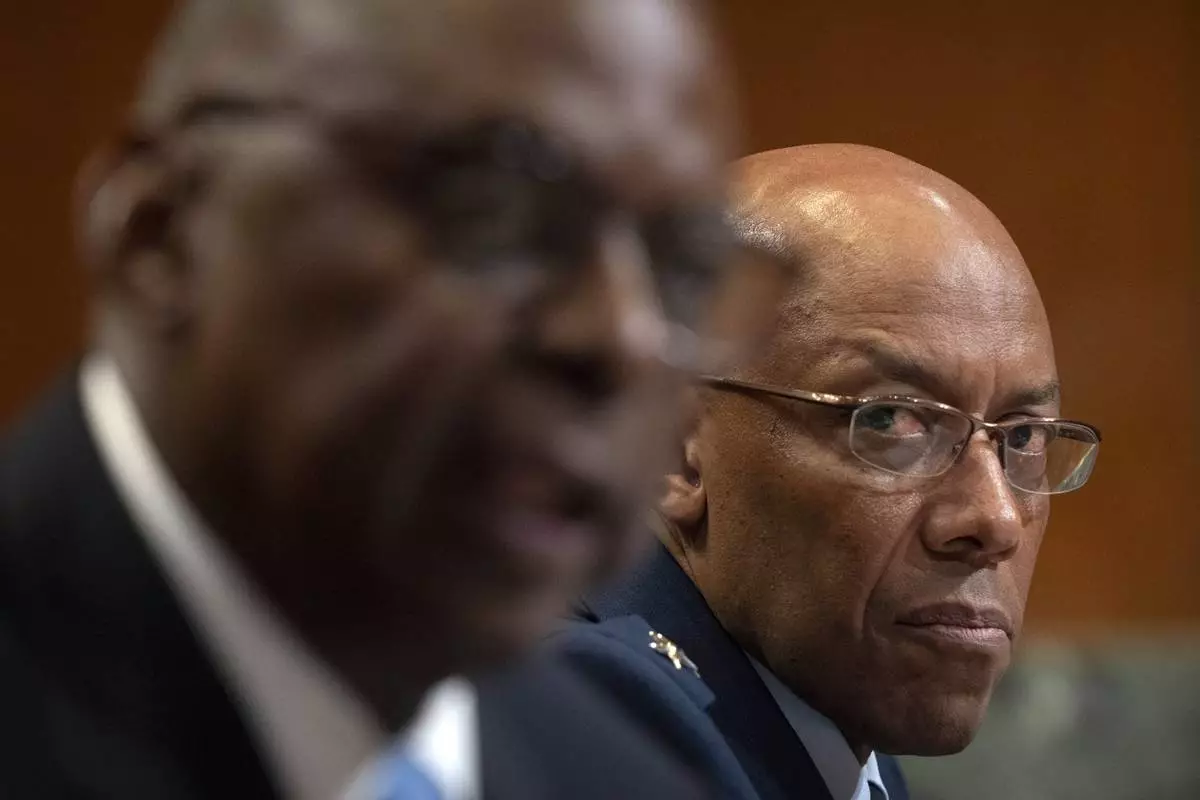
Chairman of the Joint Chiefs of Staff Air Force Gen. CQ Brown, right, listens as Secretary of Defense Lloyd Austin, left, speaks during a hearing of the Senate Appropriations Committee Subcommittee on Defense on Capitol Hill, Wednesday, May 8, 2024, in Washington. (AP Photo/Mark Schiefelbein)

Protestors opposed to the war between Israel and Hamas stand before a hearing of the Senate Appropriations Committee Subcommittee on Defense with Secretary of Defense Lloyd Austin and Chairman of the Joint Chiefs of Staff Air Force Gen. CQ Brown on Capitol Hill, Wednesday, May 8, 2024, in Washington. (AP Photo/Mark Schiefelbein)

Sen. Lindsey Graham, R-S.C., speaks during a hearing of the Senate Appropriations Committee Subcommittee on Defense with Secretary of Defense Lloyd Austin and Chairman of the Joint Chiefs of Staff Air Force Gen. CQ Brown on Capitol Hill, Wednesday, May 8, 2024, in Washington. (AP Photo/Mark Schiefelbein)
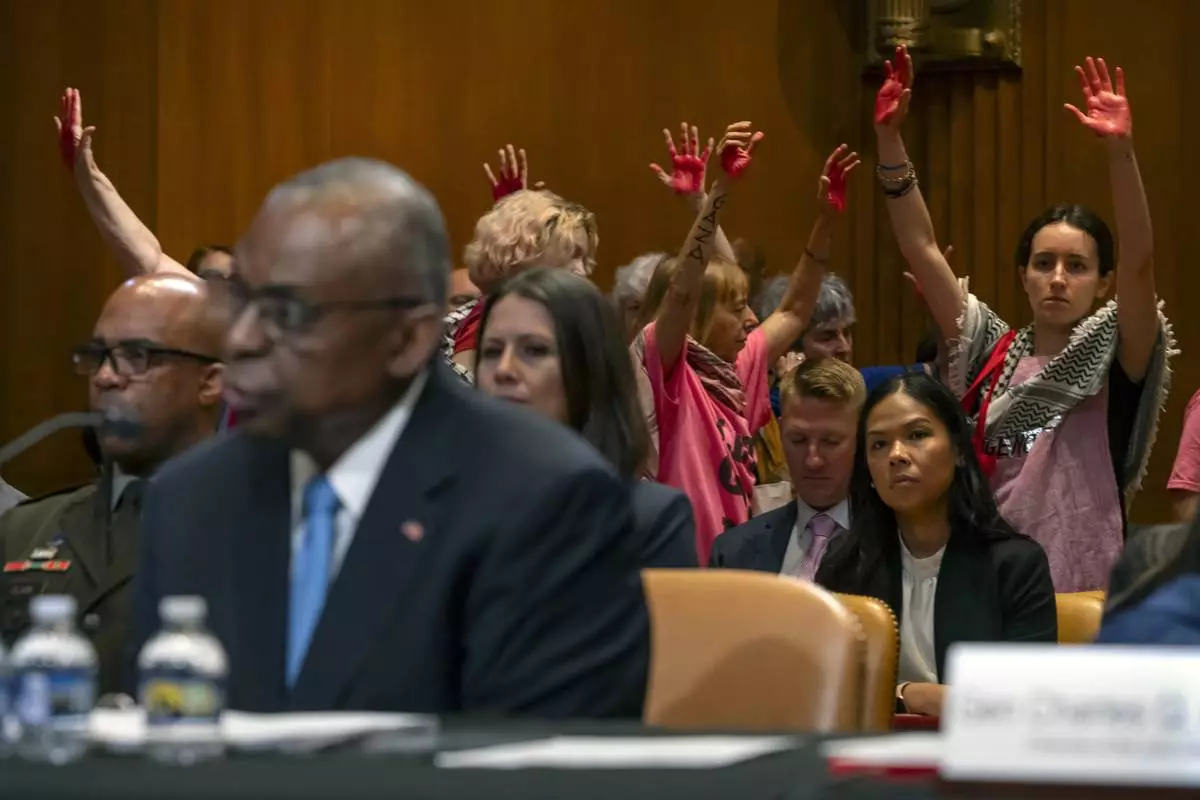
Protestors opposed to the Israel-Hamas war are escorted out as Secretary of Defense Lloyd Austin, left, speaks during a hearing of the Senate Appropriations Committee Subcommittee on Defense on Capitol Hill, Wednesday, May 8, 2024, in Washington. (AP Photo/Mark Schiefelbein)

Secretary of Defense Lloyd Austin attends a hearing of the Senate Appropriations Committee Subcommittee on Defense on Capitol Hill, Wednesday, May 8, 2024, in Washington. (AP Photo/Mark Schiefelbein)

White House press secretary Karine Jean-Pierre speaks during a briefing at the White House, Tuesday, May 7, 2024, in Washington. (AP Photo/Evan Vucci)

President Joe Biden speaks at the U.S. Holocaust Memorial Museum's Annual Days of Remembrance ceremony at the U.S. Capitol, Tuesday, May 7, 2024 in Washington. (AP Photo/Evan Vucci)
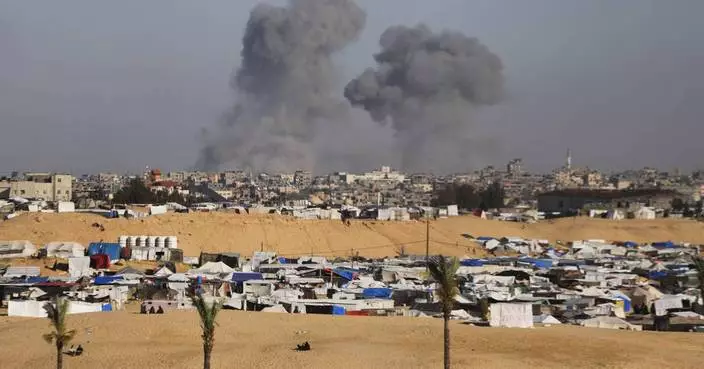
Pentagon chief confirms US has paused bomb shipment to Israel to signal concerns over Rafah invasion

Pentagon chief confirms US has paused bomb shipment to Israel to signal concerns over Rafah invasion
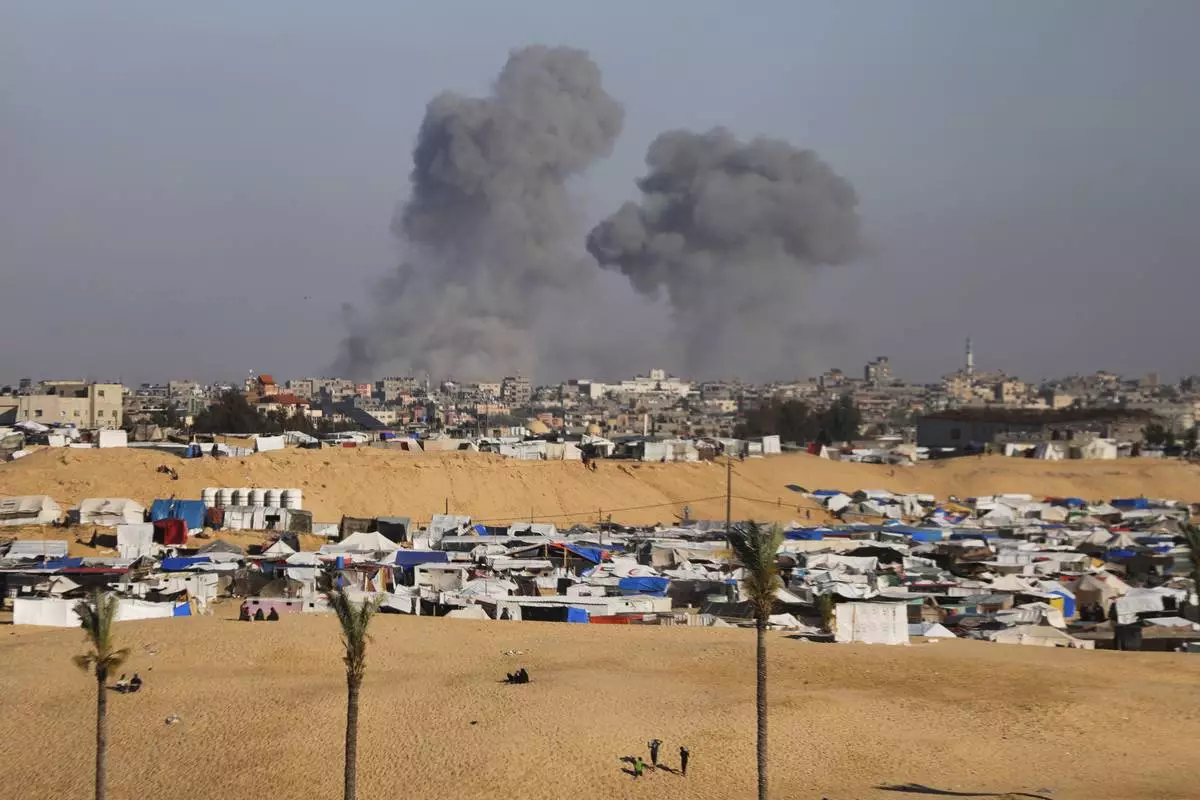
Smoke rises following an Israeli airstrike east of Rafah, Gaza Strip, Monday, May 6, 2024. (AP Photo/Ismael Abu Dayyah)













